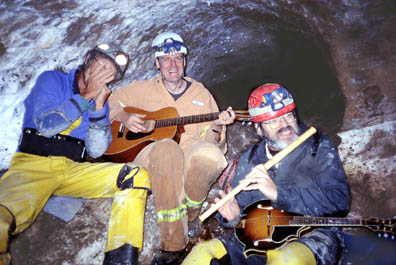In actuality, there is an omnipotent and omniscient deity watching over all of the Universe, coordinating all of the myriad interactions between objects to make them seem to be collections of particles and waves that behave in perfect harmony with an inviolate set of natural laws. This is all an illusion, however; this deity is the Great Comedian, Shecky. At some point, known only to the mind of Shecky, He will abruptly drop the facade that causes the Universe to appear to make sense. This will happen at the Moment of Greatest Comedic Effect, when all will know Shecky’s Truth, and there will be much wailing and moaning and gnashing of teeth. So perfect and pure is the Comedy, however, that mere days later everyone will think back to the MGCE, nod their heads, and with a thoughtful and appreciative grin remark, “Yeah, that was pretty funny.”
Science acquires knowledge primarily through through two methods of inference: inductive reasoning (extrapolating specific cases to a general proposition), and deductive reasoning (interpolating a general proposition to a specific case).
When we observe empirical phenomena in nature and propose a general theory to account for these observations we are using inductive reasoning. Example:
Specific cases: In my experience, every time I have ever banged my head against the wall, it is immediately followed by pain the area where I've banged it.
General Theory: If you bang your head on wall, your head will hurt.
What could possibly easier than that, right? Well, the philosophers can never seem to leave well enough alone, can they? So about two hundred years ago the great Scottish philosopher David Hume formulated the "problem of induction" (when he wasn't chasing sheep about).
Let's give an example of the Problem of Induction, using a conversation with my contrarian friend Justin at party.
Me: So, pancakes tomorrow morning at Pancake Haus then?
J: If it comes, yes.
Me: What do you mean "If it comes"?
J: Well, if the sun rises and morning comes. Then I'm in for pancakes.
Me: Well of course the sun will rise tomorrow.
J: Really? What makes you think that?
Me: How many beers have you had? The sun rises every morning.
J: Well, yes it's risen every morning since I can remember, I grant you. But what makes you think it'll rise tomorrow?
Me: Well, because it's risen every other morning, for all time, since anyone can remember, so much so that we can predict to the minute when the corona is going to pop over the horizon.
J: I don't disagree with your data--that the sun has always risen in our experience. I just disagree with your theory--that it will rise tomorrow. What's the basis of your theory?
Me: Well the sun has always risen before.
J: I know, we've established that.
Me: So if it's always risen before, then it'll rise again tomorrow. Duh!
J: Well, it could rise tomorrow. On the other hand, Shecky, the Great Comedian might decide he needs a giggle and drop his MGCE on us. So you can't be absolutely certain the sun will rise tomorrow.
Me: Justin, you are truly the most exasperating collection of subatomic particles ever to aspire to conscious thought. OK, fine! I can't be certain that the sun will rise tomorrow, but I can be 99.9999% sure.
J: How many nines is that?
Me: A bunch, smartass.
J: And why's that?
Me: Because the sun has risen 999,999 times before.
J: And so the probability of the sun rising tomorrow is based wholly on what has happened in the past, with absolutely no bearing on what might before the sun rises tomorrow?
Me: Well, when you put it that way...
J: A moment ago we established that, just because the sun has always risen in the past does not mean it will rise tomorrow. It seems to me you are merely taking a weaker stance of the same position now, by claiming that since it has risen a million times in the past, it will almost certainly rise tomorrow.
Me: Well, what could possibly stop the sun rising tomorrow Justin?
J: Well, any number of things. Shecky, the Great Comedian--
Me: --can cram his MGCE where the sun don't shine. The chances of that happening are infinitesimal.
J: But you have to allow for the chance, however infinitesimal, right? I mean it may be that Shecky just made up his mind moments ago and that, because his mind is already made up, there is actually a 100% chance that the sun will not rise tomorrow.
Me: Arrrgh, my brain!.
J: You've already opened the door here. I'm not asking for much. I'm just saying that there's a chance of that.
Me: OK, OK fine.
J: So, in fact, you can't tell me with any probability whatsoever that the sun is going to rise tomorrow, can you?
Me: I'm going to get another beer. Don't wait up.
J: But we're still on for pancakes tomorrow morning, right?
Believe it or not, conversations with Justin are actually like that.
So here, illustrated, is the "problem of induction." It s not rational. It is ultimately a circular argument relying on itself for justification. We see a pattern and we extrapolate from that a general principle, but there is no explanation for the principle other than the fact that we saw the pattern.
Indeed, finding patterns is one of the things that we do best. How long does your turn signal mechanically click before you pick up a beat, before every third click is just a tad bit louder? In that case, the pattern isn't even there. Pattern recognition is a basis of human intelligence. Perhaps we evolved that way; perhaps recognizing similarities in different situations ("You know, last time I saw one of those orange and black stripey things, it didn't end well.") made us more evolutionary fit. Indeed, I would argue that pattern recognition brings us satisfaction, even joy. Music can be described as a flux of harmonious patterns. Poets often relate disparate experiences through patterns of metaphor and simile, creating a sort of intuitive leap for the reader, evoking a satisfaction akin to "getting" a joke.
I guess the question is this: are those patterns we tease out using inductive reasoning really there as part of an underlying order, or is this human beings following a evolutionary imperative to impose design upon the universe?



























